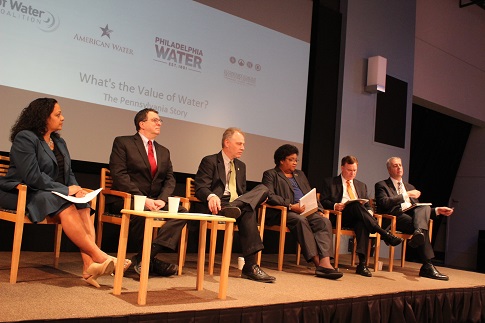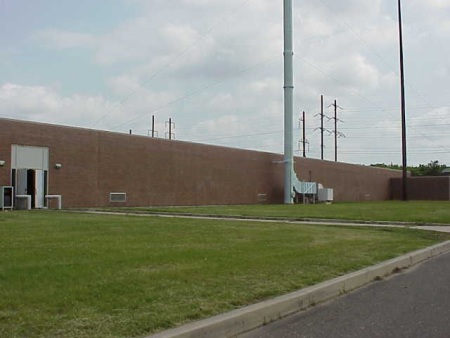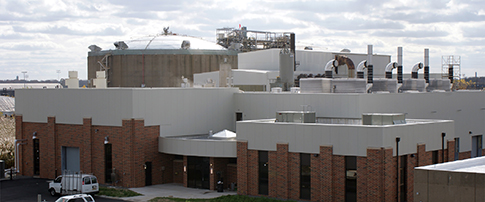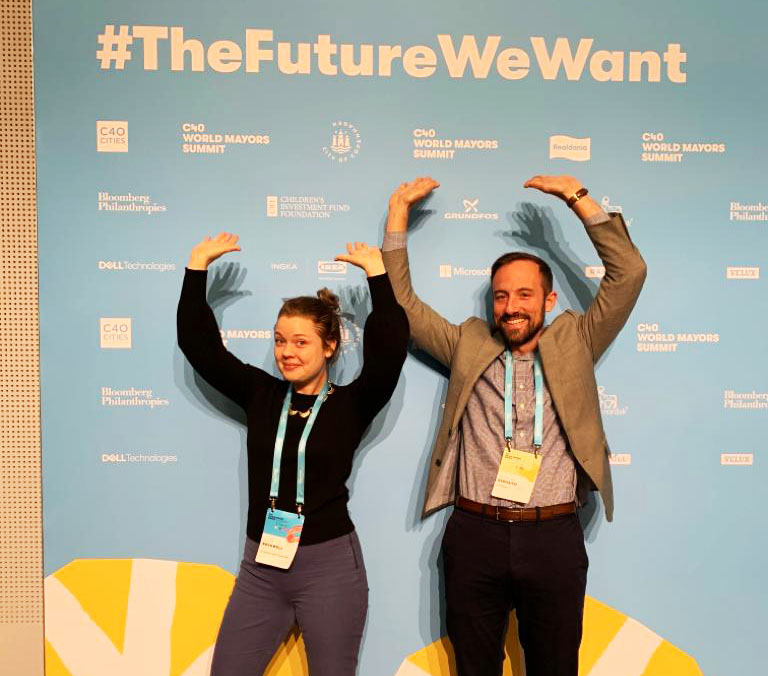
The panel at Value of Water Coalition's WHYY forum. Photo Credit: Brian Rademaekers
The tragic Amtrak crash that claimed eight lives and left hundreds injured in Port Richmond last week was an inescapable topic for panelists speaking at the May 14 Value of Water Coalition forum at WHYY's studios. Organized as a National Infrastructure Week event, What’s the Value of Water? The Pennsylvania Story featured five speakers, including Philadelphia Water Commissioner Howard Neukrug.
Like others at the forum, Neukrug noted how the “terrible” Amtrak tragedy sparked an intense and emotional debate about the importance of infrastructure investments.
“It’s fascinating to watch this discussion that’s happening with infrastructure now,” Neukrug told the audience, noting the tone in Washington D.C. became “very partisan, very quickly.” But, Neukrug said, there are valuable observations to be made regarding how people think about infrastructure funding.
“If you really want to create change in the city, or to create change in infrastructure in America, there are only two ways to do it … one is crisis, and the other one is leadership. What’s fascinating is that, if you watch this, crisis ain’t working,” said Neukrug. “Crisis happens. You can look at California today and realize that they’re just about out of water. And, yes, there are some policy shifts, and they are trying to figure out how to conserve water at the tap … but no big innovative change has come out of it. So, that takes the two ways of creating change and kind of shoves crisis to the side and leaves us with leadership.”
Pointing to the tagline in the new Philadelphia Water logo – “Est. 1801” – Neukrug detailed the city’s long history as a leader in innovative water management, starting with the creation of Fairmount Park as a means of protecting drinking water sources and the development of the Fairmount Water Works to deliver that drinking water.
As for more recent examples of leadership, Neukrug pointed to Philadelphia Water’s 25-year Green City, Clean Waters plan, a nationally recognized model that uses Green Stormwater Infrastructure to achieve federal stormwater requirements while saving taxpayer money and contributing to the larger goal of making Philadelphia the greenest city in the country.
He also pointed to the department’s Biogas Cogeneration Facility at the Northeast Water Pollution Control Plant, which turns human waste into energy needed to run treatment plants. Features like that and the sewage geothermal installation and solar photovoltaic system at the Southeast WPCP are important in part because they reduce air pollution, but also because every dollar not spent on energy is a dollar that Philadelphia Water can spend on improving infrastructure.
Neukrug said the ultimate goal isn’t just to get treatment plants to a “net zero” status where they are using no outside energy, but to create “net positive” facilities that can actually produce power for use elsewhere. That forward thinking recently saw the city awarded with the U.S. Environmental Protection Agency’s Green Power Leadership Award.
“We have really changed the game in Philadelphia,” Neukrug told the panel.
For more on Commissioner Neukrug’s comments during the forum, check out the video clips below.
Commissioner Neukrug's Opening Remarks:
Commissioner Neukrug on Biogas and Net Zero Energy Goals:
Other panelists at the forum were: Beverly Coleman, Assistant Vice President for Community Relations and Economic Development, Temple University; Robert Puentes, Senior Fellow, Brookings Metropolitan Policy Program; Aldie Warnock, Senior Vice President of External Affairs, Communications and Public Policy, American Water and Steven Wray, Executive Director, Economy League of Greater Philadelphia.
Want more? Read Value of Water Coalition’s latest report, The New Wave of Innovation.


